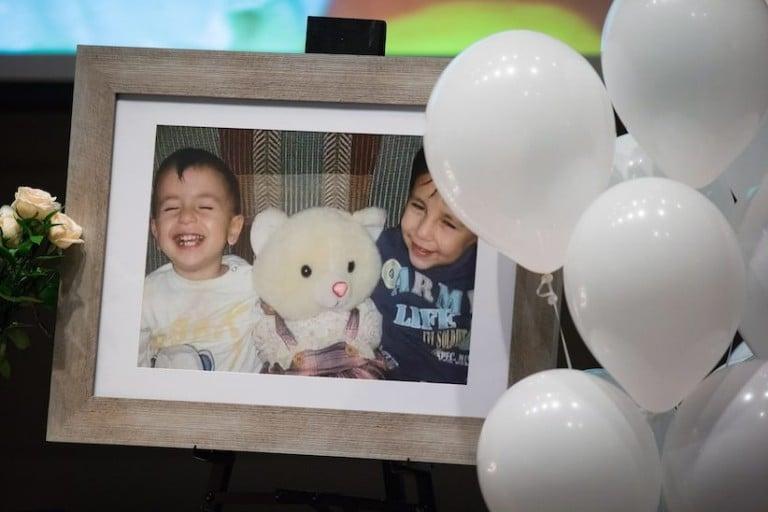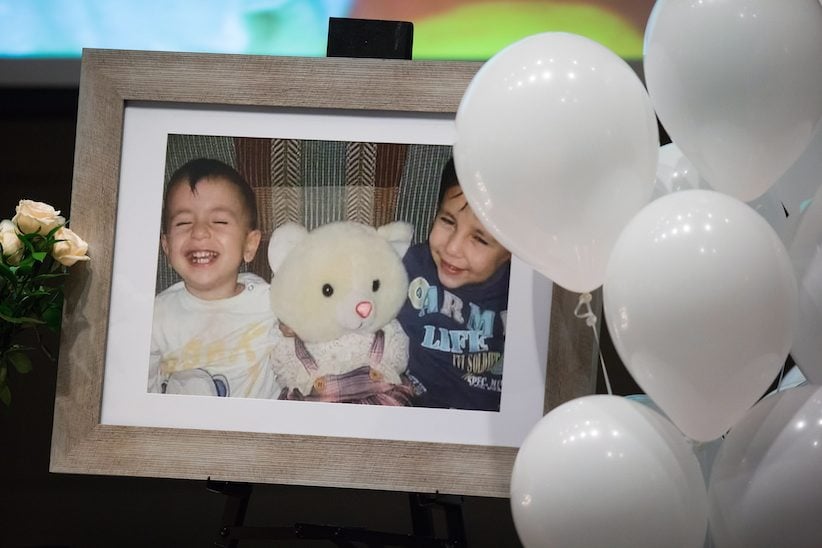Red tape, paperwork and the Syrian refugee crisis
Michael Petrou takes a closer look at the Canada’s role in the story of Alan Kurdi and his family

A photograph of brothers Alan and Ghalib Kurdi is displayed during a memorial service for them and their mother in Vancouver, B.C., on Saturday. The brothers’ aunt lives in the Vancouver area. (Darryl Dyck, The Canadian Press)
Share

Did Canada turn away relatives of Alan Kurdi, the toddler whose photograph as he lay drowned on a Turkish beach outraged the world, or did the family simply lack the patience to navigate the necessary bureaucracy Canada requires from those hoping to be sponsored by relatives or other supporters in Canada?
We now know that Alan Kurdi’s aunt, Tima, did not formally apply to sponsor Alan and his immediate family: his brother, Galib; mother, Rehanna; and father, Abdullah. All but Abdullah perished when the dinghy taking them from Turkey to Greece capsized.
Tima’s plan was to bring the family of another brother, Mohammed, here first, followed by Abdullah’s family. But when her application to sponsor Mohammed failed, Abdullah decided to take his family to Europe.
Related reading: Inside the Syrian refugee crisis
According to Immigration Minister Chris Alexander, Mohammed’s application was not rejected, but was “returned to the applicant with a request for additional documentation—in this case, confirmation of refugee convention status, as determined by the UN High Commission[er] for Refugees.”
The UNHCR, however, does not register Syrians in Turkey. None of the Syrians in the country have legal refugee status, explained Turkey’s ambassador to Canada, Selcuk Unal, in an interview with Maclean’s last week.
One would like to assume Alexander knows this and perhaps misspoke. And there are other documents that prospective Syrians in Turkey might produce to prove they have registered with Turkish authorities, as required by Canada’s private sponsorship program. But, as my colleague John Geddes and I tried to illustrate in this article, the process for privately sponsoring a Syrian refugee remains onerous.
Even the simple requirement that applicants have a valid passport would preclude many. And there may be additional obstacles facing a refugee who wishes to be sponsored through the “group of five” process, in which five or more Canadian citizens, rather than a pre-approved “sponsorship agreement holder” (such as a church or community group) agree to support a refugee. This is how Tima Kurdi hoped to bring her family here.
Related reading: A Maclean’s primer on Syrian refugees
But are those obstacles surmountable?
The answer, at best, might be: barely. At worst: no.
In 2004, Citizenship and Immigration Canada (CIC) “restricted” sponsorship agreement holders from sponsoring refugees in Turkey, due to what it described as difficulties in obtaining an exit visa. It was only last year that CIC began a pilot project to accept a “small and limited” number of applicants from sponsorship agreement holders for refugees in Turkey. It planned to accept up to 100 people. By comparison, between 2013 and 2015, Canada settled 3,500 government-assisted refugees out of Turkey.
It seems, then, that the Kurdi family’s only hope was to win the lottery and land on the list of up to 100 Syrians, Iraqis, Iranians and Afghans and others in Turkey that Canada planned to bring here under its recently launched pilot project. That chance might not have been available to Tima Kurdi, as it’s unclear whether G5 applicants could apply through this project.
It’s unclear, also, whether the project works. Despite repeated requests from Maclean’s, CIC has not provided the number of refugees who have come to Canada from Turkey by means of private sponsorship. I’m aware, second-hand, of one couple from Iraq.
Alexander’s statement that Tima Kurdi’s application on behalf of her brother Mohammed was not rejected, but returned with a request for more information, might therefore be technically accurate. But it doesn’t really capture the whole truth. For that, we’re better off turning to journalist Terry Glavin, who broke this story, describing Tima’s drowned nephew, Alan: “The little angel never had a hope in hell.”